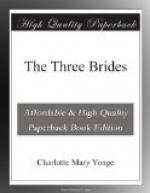Julius answered more warily, “Does he wish it?”
“No; but he is too weak yet, and is hipped and morbid.”
“Well, Phil, I would not put it into his head. No doubt you would take very good care of him, but I doubt whether your father would like the Bishop to hear of him—under the circumstances—going to disport himself at the dragoon mess. Besides, I don’t think he will be well enough before Lent, and then of course he could not.”
This outer argument in a man’s voice pacified Phil, as Julius knew it would, much better than the deeper one, and he contented himself with muttering that he should write to his father about it, which every one knew he was most likely not to do.
Who could have foretold last Christmas who would be the party at that dinner? Mrs. Poynsett at the head of her own table, and Miles in the master’s place, and the three waifs from absent families would have seemed equally unlikely guests; while of last year’s party—Charlie was in India, Tom De Lancey with the aunts in Ireland, Cecil at Dunstone. Mrs. Duncombe was perfectly quiet, not only from the subduing influence of all she had undergone, but because she felt herself there like an intruder, and would have refused, but that to leave her at home would have distressed her hostess. Mrs. Poynsett had never seen her before, and after all she had heard about her, was quite amazed at the sight of such an insignificant little person as she was without her dash and sparkle, and in a dress which, when no longer coquettish, verged upon the slovenly.
Poor thing, she was waiting till the Christmas visit of the elder Mrs. Duncombe’s own daughter was over, so that there might be room for her, and she was thankful for the reprieve, which left her able to spend Christmas among the privileges she had only learnt to value just as she was deprived of them. She looked at Mrs. Poynsett, half in curiosity, half in compunction, as she remembered how she had helped to set Cecil against her.
“But then,” as she said to Rosamond, in going home, “I had prejudices about the genus belle-mere. And mine always knew and said I should ruin her son, in which, alas! she was quite right!”
“She will be pleased now,” said Rosamond.
“No, indeed, I believe she had rather I were rapidity personified than owe the change to any one of your Rector’s sort. I have had a letter or two, warning me against the Sisters, or thinking there is any merit in works of mercy. Ah, well! I’ll try to think her a good old woman! But if she had only not strained the cord till it snapped, how much happier Bob and I should have been!”
What a difference there is between straining the cord for one’s self and for other people! So Julius could not help feeling when Herbert, in spite of all that could be said to him, about morbid haste in renunciation, sent for the village captain of the cricket-club, and delivered over to him the bat, which had hitherto been as a knightly sword to him, resigning his place in the Compton Poynsett Eleven, and replying to the dismayed entreaties and assurances of the young farmer that he would reconsider his decision, and that he would soon be quite strong again, that he had spent too much time over cricket, and liked it too well to trust himself at it again.




